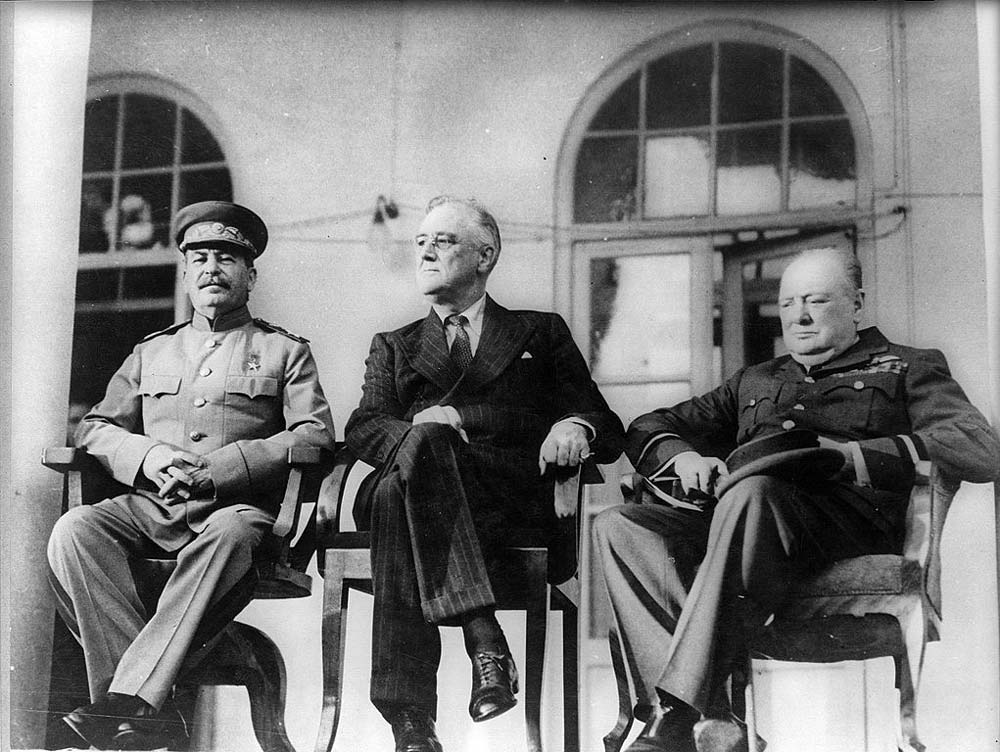Tehran Conference was the meeting between the U.S., U.K., and Soviet leaders (Roosevelt, Stalin, and Churchill) from November 28, 1943 to December 1, 1943, where they discussed post war activities and hopes. During the meeting they coordinated the military operations that were to take place against Japan and the German forces.
The three men also discussed a series of events that were to take place following the war time period. The most notable and important part of the meeting was for what would come next against powers in Asia and Europe, following the war. The discussions also led to the carrying through of Operation Overlord, the invasion of France in May 1944. Stalin also agreed that the Soviets would declare war on Japan during the Tehran Conference to show a united front between the 3 nations; in response to the declaration of war, Roosevelt would concede to the demands Stalin had for Kurile Islands, and other terms that the countries agreed upon.
Eastern European Fate
During this conference, the three leaders discussed the important issues concerning E. Europe and Germany after the war. The leaders agreed to concede Poland to the Soviet, in return for pushing the Polish-German border, to Neisse River. Roosevelt also negotiated terms that certain nations were to be reincorporated back in to the Soviet after the war, and issues of dismemberment of certain nations in Europe, were also discussed during the Tehran Conference.
International Cooperation
During the Tehran Conference, international cooperation was also discussed between the 3 nations and the 3 leaders. The United Nations’s composition was discussed privately between Stalin and Roosevelt, where he outlined to Stalin the vision he for the U.N. and the 4 policemen (U.S., China, Britain, and the Soviet). These nations would hold the power to deal with any of the threats made on peace, or a sudden emergency, which would require an immediate action to be taken, in order to keep peace, and to avoid any confrontation.
The Declaration of the Powers
A final area of discussion during the conference was the “Declaration of these Three Powers,” in regards to Iran. In this declaration, the nations thanked Iran for their cooperation in the war. In return for their support against Germany, they offered Iran economic assistance. They extended the offer throughout the war as well as after the war ended, in case the country still needed financial assistance. The three powers also stated the desire for territorial integrity, for maintaining independence, and for the sovereignty of Iran.
The U.S.
During the term of the Tehran Conference, Roosevelt had secured many of the objectives and desires that had been set forth during the conference. One of the main objectives was to get the Soviets to declare war on Japan, in an attempt to show a united front. They wanted to show that the three nations, which had a massive fleet, were working together in an attempt to bring down enemy forces, both German as well as Japanese forces.
Additionally, Stalin expressed his support to the U.S. and Roosevelt in the plans that set forth what would happen for the United Nations and what was to come following the war. Another major benefit from the Conference was the fact that Roosevelt felt he had won over Stalin and the Soviet’s confidence and support, and proved that the U.S. was willing to do negotiate directly with the Soviet Union. Additionally, when Roosevelt agreed to the first and the second opening fronts in France (by 1944 in the Spring), it showed the U.S.’s willingness to negotiate with Stalin in order to make them an ally.
The conference that opened many doors and allowed the three Allied powers to take down the forces of the Japanese, Germans, and other belligerent forces during World War II as well as post war time period. The leaders were able to build a united front and establish a plan according to their preferences regarding the war’s conclusion in order to promote peace for all nations.
